
Ever since the adoption of the Universal Declaration of Human Rights in 1948 there has been a debate on the issue of universality and cultural diversity. Nowadays, this debate is not so much framed in terms of opposites, but more in terms of reconciliation.
Under the international human rights framework, States are allowed to take cultural particularities into account when implementing the treaties. The UN human rights treaty bodies which monitor the implementation of the treaties by States have an important role to play in ensuring a proper balance between safeguarding the universality of the rights, while at the same time leaving room for cultural particularities in the interpretation and implementation of those rights by States. This book examines how the UN treaty bodies, in particular the Human Rights Committee, the Committee on Economic, Social and Cultural Rights and the Committee on the Elimination of Discrimination against Women, fulfil this role.
The research shows that human rights are used as a sword to protect and safeguard culture and cultural diversity, and as a shield to protect against harmful aspects of culture. It also looks in-depth at the dialogue between treaty bodies and States parties, and the way cultural arguments are dealt with. The study concludes that the treaty bodies are first and foremost guardians of the universality of human rights. They use their monitoring role not so much (actively) to reconcile universality and cultural diversity or to accommodate cultural variation, but more to determine the limits of such cultural variation.